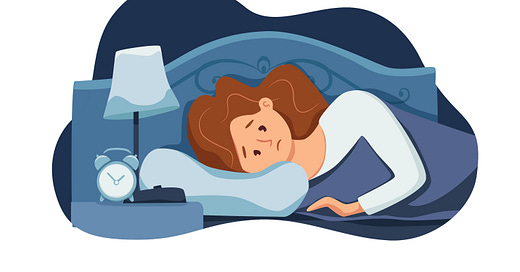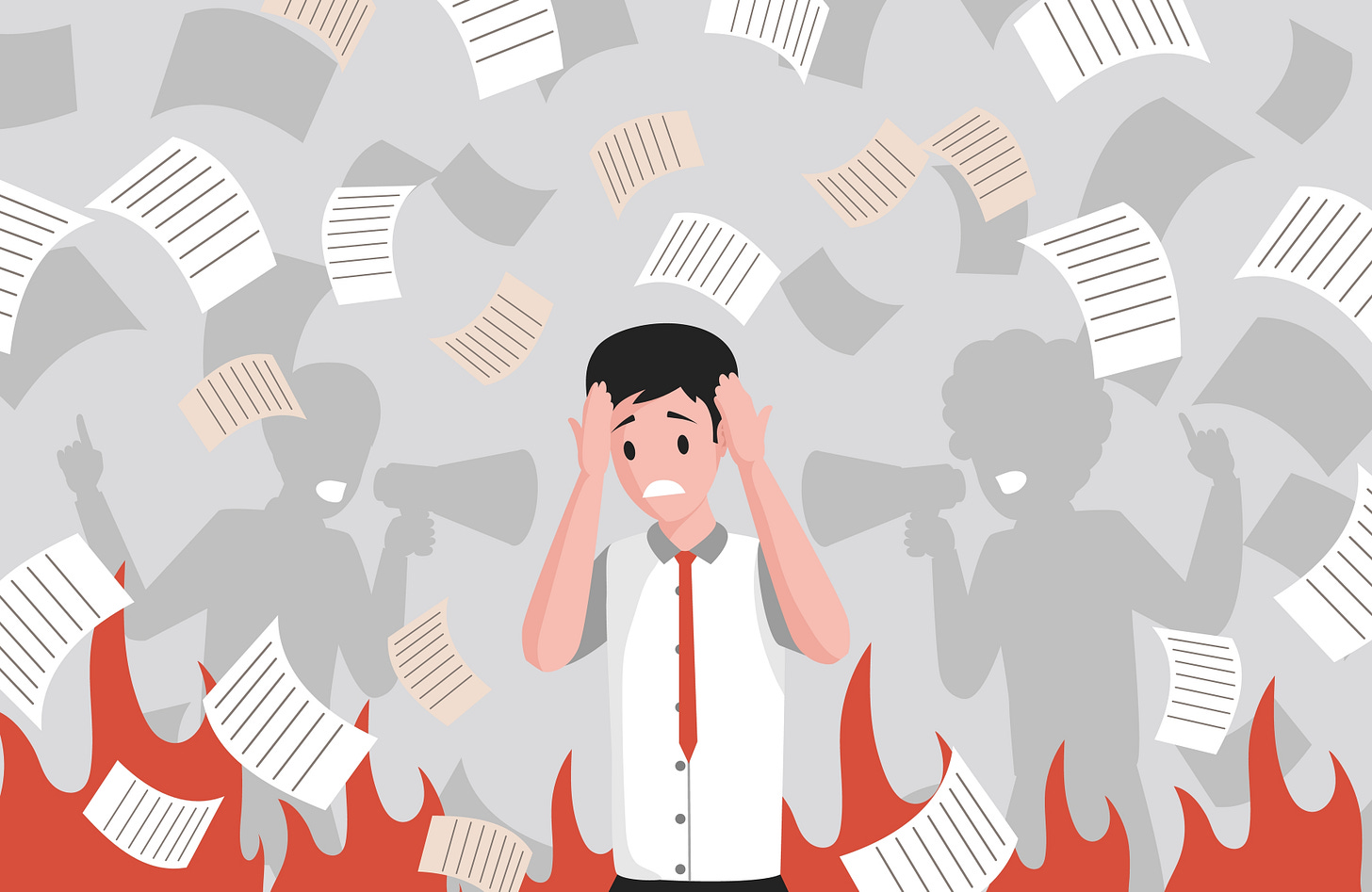Welcome to my weekly newsletter building a supportive community for Highly Sensitive People (HSPs).
Until you’ve experienced workplace bullying first-hand, it’s impossible to appreciate quite how devastating the impact can be. The insidious effect of being constantly demeaned, confused, manipulated and gaslighted by a manager can dominate our every waking moment, deprive us of sleep, seep into our intimate relationships, and leave us frantic for a way out.
This is a topic close to my heart. I went through a period of being bullied when I was doing psychology research at a university in my twenties. And I’ve supported many clients being bullied while working for big companies in the City, and saw many cases during the pandemic, when remote working brought bullying into the home.
In each case, I’ve learned more about the corrosive effects bullying can have on the target’s mental and physical health, and how often companies prefer to look the other way. And I’ve begun to understand how bullying can play out for Highly Sensitive People (HSPs).
Bully magnets
The hard reality is that HSPs are bully magnets. Our high levels of empathy, creativity and emotional intelligence threaten people who’ve become so cut off from these qualities within themselves that the only way they can find relief is to snuff out the spark in others.
We’ve all heard the phrase “hurt people hurt people.” There’s no doubt that bullying is often committed by people who suffered such severe childhood trauma that the only way they learned to regulate their nervous system was by inflicting suffering on others. Nobody would choose to live that way. But as narcissism expert Dr Ramani Durvasula points out, we have to walk a line between compassion and self-preservation. We can always remember that even the most apparently damaged person contains a seed of light. But we mustn’t let our HSP tendency to see the best in others, or give people the benefit of the doubt, blind ourselves to abuse.
This is a huge topic, and the following thoughts are intended as a starting point for discussion — rather than an exhaustive list. (As always, I love to hear about your experiences in the comments). There are various websites out there with generic tips for how to handle bullying. My thoughts here are tailored particularly for HSPs.
Name it
Until you’ve been bullied, it can he hard to grasp quite how difficult it is to handle. We might have heard friends talking about being bullied, nodded sympathetically, and thought: “I’d never let that happen to me.” It’s only when it does happen, and you’re months into the ordeal, that you might look back and realise how the bullying had subtle beginnings that you barely noticed at the time.
Your manager may have made a seemingly offhand remark questioning your commitment to the job. Or perhaps you had a difference of opinion and she used her position in the hierarchy to belittle you. Or maybe he began making impossible demands, or punished you for “failing” to meet an ill-defined standard— wearing you down with a relentless micro-management. They withhold information, fail to respond, make decisions without you and exclude you from key meetings. They may swing between hostile, demanding and needy — and subject you to emotional outbursts that nobody else sees.
When you’re the target of a sustained campaign of bullying, there comes a point where you realise that there’s more going on than poor management, or a lack of professional courtesy. You begin to acknowledge that you’re the target of a systematic process that aims to undermine your self-respect, shatter your self-confidence and leave you feeling humiliated and alone.
Nevertheless, we might feel considerable reluctance to apply the term bullying to our situation, asking: “Is what’s happening to me really bad enough to be called bullying?” Nobody likes to think of themselves as a victim — and the word “bully” might carry connotations of being picked on at school. But I’d invite you to consider the benefits of embracing the word. Because bullying usually follows well-documented patterns, naming this behaviour is a big step towards taking empowered action in response.
Your health is your priority
There may not be any quick answer to your situation. I have worked with many clients who have been bullied at work who’ve been forced to take long-term sick leave, or who’ve felt they had no other choice than to put up with a bullying environment for years. Ultimately, though, your health must be your priority. The dilemma for HSPs is that we’re often driven by a sense of mission, and may invest a lot in our professional identity. If you work in a field you care about, you’re naturally going to want to hang on. This might work as a short-term solution. But in the long-term, you have to find a way out.
Find allies
Bullies single out individuals — but put on a friendly facade to everyone else. It’s as if they have different sub-personalities for engaging with different people — which is why dealing with them can be so confusing. Our high levels of empathy and sensitivity can often mean we feel a little like outsiders as HSPs, and bullying can make that sense of isolation so much worse. Co-workers may seem baffled if you start trying to explain that you’re being bullied, and may say well-meaning but unhelpful things like: “Maybe you’re being too sensitive?” or “I’ve never had a problem with them, perhaps it’s just a personality clash? Why don’t you try and have an honest chat with them?” Many people want to give bullies the benefit of the doubt, or glaze over when you try to share your experience. Some can’t look at what’s going on clearly simply because they find it too painful. Choose your allies carefully and confide only in people you trust. Don’t let the bully cut you off — they want you to feel alone. The HSP Revolution and other communities are here to make sure that doesn’t happen.
Notice your triggers
Bullies are experts at pressing our buttons. If we’re HSPs with a tendency towards people pleasing, perfectionism or rescuing, or who struggle with self-worth, a bully will sniff out these traits immediately. They’re experts in blame-shifting: holding you responsible for their own mistakes, while refusing to delegate because they’re obsessed with control. Most disconcerting of all, they’ll unconsciously project their own disowned traits on to you, accusing you of possessing the very same negative qualities that they exhibit every day, but can’t see in themselves. They gossip, smear other people, spread rumours and lie about you to other managers — and never, ever take responsibility for their actions.
HSPs, who tend to score highly for conscientiousness, may well blame themselves as their results slide — and redouble their efforts. Little do we realise that we’re falling into the bully’s trap. They will ruthlessly exploit our desire to be seen to doing a good job by setting impossible targets then withholding approval.
Typically, the bully seeks to hide such manipulative behaviours by pretending they’re simply interested in “results” or claiming to be “perfectionists” themselves — when they’re actually intent only on controlling you. You may work extra hard to satisfy their demands, still unaware that you’ll always be set up to fail. But there will come a moment where it’s time to name the bullying for what it is.
When you realise you’re being bullied, you must be honest with yourself. Where in your professional life are you still relying on external validation — rather than being your own authority on what good work looks like, or when you’ve contributed enough? In a healthy company, managers serve as wise guides who can help us to accomplish more, and become better versions of ourselves. But when the shadow side takes over, and the manager is a tyrant, the situation is an invitation to reach deep down inside yourself, and realise that the only true authority only ever lay within.
Remember: Management may protect the bully
One of the things I love about HSPs is our idealism, but we’re sometimes too quick to assume that everyone else shares our values. However much you may like individuals within your company, the group at the top may protect their own. It’s important to make a realistic assessment of how much senior managers and HR departments will be able to do for you.
Be prepared, too, for how traumatic it can be to recognise that a manager that you thought had your back is prepared to gaslight and question your version of events, simply because it would inconvenience them to admit that bullying is taking place on their watch. Some of the most painful wounds in such situations are not only inflicted by the bullies themselves, but by their enablers — especially if they include colleagues you had considered friends.
Approach bullying as an initiatory ordeal
We evolve through our greatest challenges.
I’ve observed that survivors of bullying become stronger, wiser and more empowered — which is of course the goal of The HSP Revolution.
Now is the moment to take the radical step of viewing the bullying as a form of initiation — a metaphorical death and rebirth experience that will ultimately carry us to a new level of awareness and greater sense of purpose.
Of course, this can be easier said than done. When we feel trapped at the mercy of a bullying boss, we feel the very opposite of empowered. That’s a sign to dig even deeper. We trust that there is a bigger reason for this situation than our mind may be able to grasp. It’s painful and it’s nothing that we’d have ever wanted to happen to us. But if we can imagine for a moment that we have chosen this ordeal, we may be surprised at the reserves of resilience, courage and wisdom we discover within.
Once you emerge, you’ll have a much greater sense of your own power. You’ll see more clearly how a lack of self-worth is an epidemic in the corporate world — creating a permissive environment for bullies to thrive. You may see how you had unwittingly colluded or covered for bullies in the past, and will resolve never to do so again.
You will vow that you will never again allow your boundaries to be breached.
And you will stand as an ally for other targets of bullying — serving as a shining beacon to help them navigate to safety on the other side.
See you next week,








In hindsight I recognise that my PhD supervisor was a bully. We were at a research station 10 miles away from the main University and I was his first Ph.D student. On the day I arrived to start my PhD he told me he was happy to be away from the university as his colleagues did not respect him. There were fewer than 10 people at the research station the main ones being my supervisor and his enablers. I would say that one of the enablers was also a bully. My supervisor actually never supervised me at all. Once when I asked for advice he told me to go and ask someone else! By the end of the first year I had achieved nothing and seriously enquired about leaving. I confronted my supervisor with a list of things I was not happy with including him telling me to ‘stop worrying woman’, catching him laughing about me with his enablers after I had just confided in him, receiving zero supervision etc. When I wrote my first year report it came back with no comments or corrections although I knew there were mistakes. My first international presentation received a lot of praise and an invitation to do my field work overseas. My supervisor’s colleagues were very impressed with my talk and asked me how I had been able to achieve what I had achieved with him as my supervisor!!! Thank goodness I had that invitation to go overseas, which I stretched out to delay returning to the research station and my supervisor. All this was 30 years ago. I still ruminate about it because it was so wrong. My daughter is now doing a PhD and has had trouble with one of her supervisors who she has managed to change with the help of her college - but not her department who tried to gaslight her. It seems that now PhD students are assigned 2 supervisors which is an improvement. I hope that telling her about my awful experience with my supervisor gave her the courage to do something about hers. But I must stop ruminating over something that happened so long ago.
Dear Dr Genevieve,
It is always a pleasure reading your weekly newsletter, this one particularly resonated every paragraph was a lightbulb moment!
It was helpful to remind us of the reasons why HSPs are so often targeted because of their admirable traits, many will need to hear this!
I am currently in a job which has previously been the epitome of a toxic bulling workplace. I have worked under several bosses many of which display behaviour that form part of the dark triad group of personality traits, it has been an education to say the least, I could write a book and probably will!
After quitting my garden design degree, I landed my current job on a country estate, I naively thought I might end up working with kind decent people who had a passion for the outdoors as much as me, like the presenters of Countryfile or Gardeners World haha!
My first impression of my new manager was that he was warm and welcoming, however nothing could have been further from the truth. He was an absolute manic displaying huge mood swings regularly shouting and swearing whilst drunk and high on drugs which made him paranoid and unpredictable. Out of the sight of the security cameras he would take pleasure in kicking one unfortunate female member of staff who went on sick leave for a year presumably because of the abuse. Later he received a two-year sentence for a separate and much more serious assault.
I once approached this manager regarding the unruly behaviour by a colleague who was off the rails but to my disarray he would take delight in shifting the blame, twisting my story and wondering which one of us he was going to fire, he loved mind games as much as getting inebriated on whisky.
A big issue on the estate was that there wasn’t an HR department, mangers often protected staff who were abusive by invalidating our concerns, they would sigh and shrug off remarks, downplaying the situation as if we were making a fuss, the truth is they just didn’t want to manage the problem. One particularly cantankerous staff member had repeatedly threatened members of staff, squaring up, shouting and raising his fists. I put my concerns in a letter quoting 'bulling in the workplace policy', managment eventually acted, albeit rather weakly.
In this male dominated competitive environment sensitivity equalled weakness, I eventually got the respect I deserved by becoming more disagreeable (out of character for me) indeed once or twice my amygdala became momentarily hijacked, I’m much calmer these days ha! You had to be strong-minded to work in this environment!
So, this was my initiation and although my hair is now rather thin these are the experiences that I needed in order to better assert myself and grow. I don’t think we should underestimate what any of us are capable of, I feel it is important to challenge tyranny and never let might win over right especially if you are an HPS!